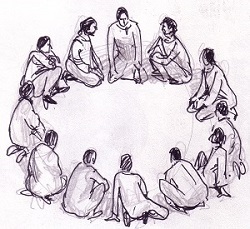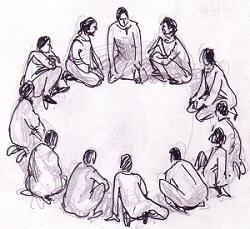

“No one claimed any of his possessions as his own, but they had everything in common” (Acts 4:32).
Acts 4:32-37; John 3:7b-15
Acts proudly describes the church as a commune united in heart and mind, sharing all personal possessions. The idea was so attractive to Karl Marx, he based the motto for communism on it. Most religious communities have not seemed a threat to the idea of private property, the cornerstone of capitalism, though voluntary poverty did earn Dorothy Day the nickname “Moscow Mary” in her FBI file. The Catholic Worker Movement mystified J. Edgar Hoover, who saw it as a threat to national security.
From the start, Christian communities were also seen as rejecting Roman patriotism and capitalism, and believers were persecuted for not participating in the civic duty to burn incense to the gods, at least until Constantine made the church part of the establishment in the fourth century. But until then, Christians were outliers in the ancient world, even from their Jewish origins.
John’s Gospel harbors an ongoing quarrel between early Christians and Rabbinic Judaism, the survivor of the destruction of Jerusalem and the Temple by the Romans in 70 CE. The break was formalized at the Council of Jamnia in 100 CE, when the church was excommunicated. The rift is reflected in today’s Gospel as Jesus is depicted as scolding Nicodemus for being an expert in the Scriptures but blind to the prophets who foretold the coming of the Christ.
The night encounter between Jesus and Nicodemus amplifies the charge that he could not grasp the truth of who Jesus was because Nicodemus was “of earth” instead of heaven. He lacks the overview “from above” that sees how God has been at work in the history of Israel to prepare it for the Messiah. He cannot see what Moses foreshadowed when he “lifted up the serpent in the desert,” that the curse would become the cure when Jesus, a condemned man, was lifted up on the cross and revealed as the Savior of the world.
The substance and tone of this theological quarrel unfortunately made John’s Gospel a source of decontextualized scripture passages that have fueled anti-Semitism in Christianity, with horrific consequences in history, ideas that were condemned by the Second Vatican Council. The church continues to struggle to own the full implications of Jesus’ death and resurrection.
The Easter message is more radical than we think. The Gospel has always been a revolutionary manifesto that begins in the heart and then infiltrates culture and society like salt, light and leaven to challenge every ideology and convention that opposes God’s plan within history. The crucified and risen Jesus calls us to see as God sees, a perspective that transcends selfish interests with the common good, unlimited individual acquisition with basic concern and justice for all.
This is the joy and challenge of the Gospel, and to be faithful we all need to know what we have gotten ourselves into.
Advertisement








